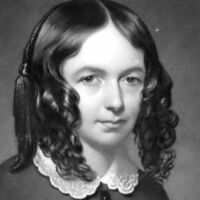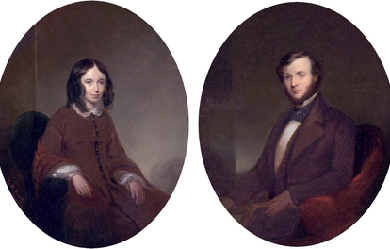The Cry of the Children
"Theu theu, ti prosderkesthe m ommasin, tekna;"
[[Alas, alas, why do you gaze at me with your eyes, my children.]]—Medea.
By Genna Rhoswen
Pluck your handfuls of the meadow-cowslips pretty,
Laugh aloud, to feel your fingers let them through!
But they answer, 'Are your cowslips of the meadows
Like our weeds anear he mine?
Leave us quiet in the dark of the coal-shadows,
From your pleasures fair and fine!
(lines 57-64)
Here the speaker is telling the child-workers to run and play like normal children, but apparently, and ironically, they refuse, because they are disillusioned. The issue of disillusionment is prevalent, whose discussion takes up almost half of the poem, especially when discussing a fall-out with religion. Even though the children are the ones being described as disillusioned, is it possible that it is not only them that are experiencing it, but adults as well? Could it be that the adults are seeing or even creating their reflection in the children? If the poem confronts the concern about child labor, is the speaker also concerned about religious disillusionment? Could the issues be both child labor and religious disillusion?
The editor of the anthology, in the biography of Elizabeth Barrett Browning said that both she and her husband had "fell out about politics and spiritualism" (p. 18), but pairing her protest against child labor with religious disillusionment links them together as concerns to be confronted. If she pairs them together and wants one to be removed, does that not suggest that she actually wants them both gone? She might share in the disillusionment, but perhaps she does not want it to be that way and would prefer life in society and what is being taught in the Bible to be congruent, rather than totally letting go of the latter. She communicates the same sentiment towards child labor. She knows that the children were not meant to be working in the mines and factories: "Let them feel that his cold metallic motion | Is not all the life God fashions or reveals" (lines 93-94). In the same way, she thinks that neither should there be any disillusionment towards religion.
The children are the subject matter of the poem, but the poet might also be pertaining to adults and society as a whole. Child labor is just a specific issue and is related to the general issue of working conditions that adults had to face daily alongside the children. Elizabeth might have just considered children working as the greater sin, but the theme of poor work conditions is universal to all ages as well as religious disillusion. Both adults and children experience it and during the time, due to the poor work conditions and the effects of industrialization, it ran rampant throughout society. The children could not speak for themselves. Nor can it be expected of them. Nor can someone be blamed for speaking for them, such as the poet. It is possible that the adult poet could be projecting her disillusion on the children in an attempt to speak and vouch for them. To say so is not to say that she is wrong. She is correct in saying that they feel unhappy laboring and being exploited, but it cannot be said that she is entirely correct in knowing what they think or believe.
Regardless of the correctness her projection of religious disillusion onto the children, including that with her protests against child labor puts it on the list of social complaints.




